Universal Basic Income is a progressive program that offers adults a consistent basic income in order to cover their costs of living. Universal Basic Income, also known as UBI, is proposed as a way to help alleviate poverty, reduce bureaucracy, and most importantly, provide a safety net for people who may be facing economic uncertainty and change from automation. Universal Basic Income provides funds without regulating how people choose to spend their money. A person can use their income on food, to reduce their number of work hours, relaxation, or anything else they desire. In recent times, with the rise of Andrew Yang’s campaign for presidency, increased praise from Silicon Valley, and a pandemic that has highlighted problems with our economic system, Universal Basic Income has become more popular. Throughout my essay, I will argue that Universal Basic Income has become especially important through our discoveries during the recent pandemic, and how different media sources and forms of media argue for UBI in different ways, in order to cater to their specific audiences and perspectives. Traditional news media sources and forms of media, such as CBC News and The New York Times, tends to maintain a traditional form of expressing their ideas, carrying a high level of seriousness, as well as idolizing public figures and valuing their perspectives most highly. Newer forms of media and media sources, such as memes and articles containing memes and podcasts, often reflect the perspectives of a younger generation, often more liberal, and carry different conventions with fewer formalities.
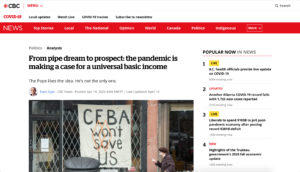
CBC News is a publicly owned news service and is the largest news broadcaster in Canada. In their article, they discuss Universal Basic Income as an idea that was previously unrealistic, but has gained more merit and traction as a result of problems associated with the recent pandemic. With analogies comparing the pandemic to wartime, and images emphasizing the needs of businesses and politicians, the article does not focus on what Universal Basic Income is, who it could help, and how it could help, but instead focuses primarily on highlighting the opinions of public figures, economists, politicians, business-people, and governments. With quotes consisting of what appears to be at least half of the article, they feature prominent figures such as Andrew Yang, the Pope and Jagmeet Singh. The article never once features a low-wage earner, a student, nor someone who lives in poverty. The intentions of CBC News, through their article, seems to be to generate more discussion of Universal Basic Income from the perspective of upper-middle-class people, business-people and those who work in government. The article, however, does not cater to the interests or experiences of people currently living in poverty, on welfare, or suffering as a result of the pandemic. Rather than focusing on the experiences of people who survive paycheck to paycheck and would benefit the most from UBI, the article remains focused on the thoughts and opinions of prominent public figures. This differs from other forms of media that explores Universal Basic Income from the perspective of low-wage earners, single parents, young people, and those who would benefit more from UBI. The consequences of an article like this is that it continues to perpetuate the dangerous idea that prominent public figures and politicians are the most important voices to highlight, most knowledgeable, and people that we should turn to in order to better understand complex issues and potential solutions such as Universal Basic Income. In effect, CBC News uses a fallacy, an appeal to authority, in order to share its perspective and entertain its readers.
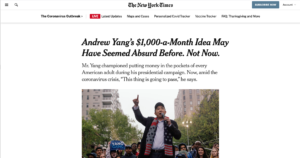
The New York Times offers a slightly different perspective to CBC News, providing more empathy to people suffering as a result of the pandemic, and focusing more on how Universal Basic Income can be a solution to prevent temporary economic collapse. The article offers a beacon of hope for people who are currently struggling, and highlights how Andrew Yang’s ideas to overcome economic uncertainty as a result of automation are now successfully being used to help during the pandemic. Rather than focusing on public figures themselves and addressing the needs of business-people, The New York Times caters more towards what individual Americans might be experiencing, and how Universal Basic Income can help them. Despite this, their interviews and quotes remain focused on the ideas of politicians and economists, as opposed to the people who would actually benefit from UBI. The intentions of this article seems to be to highlight that despite being dismissed by most of the country only several months ago, Andrew Yang and his ideas have now become a solution and essential for the survival of the American people and economy.
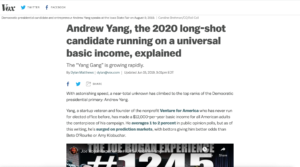
Taking a different approach and appealing to a younger audience, Vox presents Andrew Yang as a personable, young, startup entrepreneur whose success is driving Universal Basic Income’s recent popularity. With the writing much more relaxed and informal, throughout the article, Vox shares popular slang such as, “Yang Gang” (Matthews, 2019) and “Yangsters” ( Matthews, 2019), refers to Universal Basic Income as Yang’s, “Freedom Dividend” (Matthews, 2019), notes how Andrew Yang has been a part of several popular podcasts, including The Joe Rogan Experience and Sam Harris’s show, and incorporates memes into their article to add a layer of comedy. Alongside its appeal to a younger audience more familiar with internet culture, the article explores controversies, such as recent admiration from communities associated with the alt-right and white supremacy. It does note, however, that Yang is quick to denounce their praise, condemn racism, and rejects their support, even as voters. Vox also shares a post from Wikileaks, which is an organization broadly considered anti-establishment by many traditional-thinking and conservative people. Vox is a news website founded by journalists and entrepreneurs in 2014. As a younger, independent organization, Vox provides news on its own web platform, via Youtube, podcasts, and even has a show on Netflix. As such, it caters its information and stories to younger audiences as opposed to traditional business-people and politicians such as on CBC News. The consequences of their article and content medium may be that instead of alienating younger people, it alienates older generations who are less familiar with internet culture, and prefer traditional ways of writing and expressing ideas.
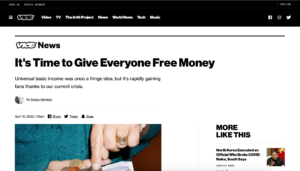
With a provocative and click-bait title, Vice’s article approaches Universal Basic Income from a progressive standpoint while examining both sides of the debate. They highlight problems within the current system, different strategies that have been used, and note different reasons why Universal Basic Income could be a solution. In addition, they point out many concerns of UBI that are missing in articles from other news sources, while still arguing that the pandemic has proven UBI’s necessity in the modern economy. Vice even challenges the current establishment by arguing that the cost of UBI could be similar to the cost of bailing banks out during the financial crisis, only with UBI, it would be helping individuals and small businesses. Lastly, Vice’s article focuses more on the debt crisis and wealth inequality, which are problems that are most commonly explored amongst progressive liberals. The intentions of Vice in their article is to promote Universal Basic Income as a viable and helpful solution to move forward in the economy. It challenges current ideas of the role of government and uses UBI’s success during the pandemic to back up its claims. Similar to Vox’s article, Vice explores a serious topic while maintaining a degree of informality.
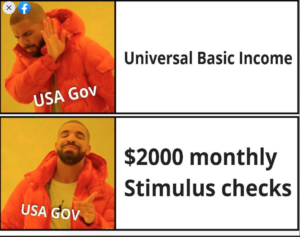
In contrast to articles written by formal news organizations and journalists, memes are generally created by individuals and reflect their ideas and experiences more broadly. While news articles navigate biases and preferences from their writers, editors, collaborators, and organizations, meme creation has no structured hierarchy and can be created much more quickly, reflecting the ideas and biases of the individuals creating them. In this meme, the creator points out the hypocrisy of the US government for staunchly dismissing Universal Basic Income, while later embracing monthly stimulus checks. Interestingly, Universal Basic Income and monthly stimulus checks are effectively the same thing. Because memes do not have the ability to share as much background information, nor to explain themselves, many are much more open for interpretation. Memes, like articles, carry many assumptions, biases, and unspoken ideas. This meme, in particular, suggests that the US government and population are either somewhat delusional, does not understand that UBI and stimulus checks are effectively the same thing, or that narratives play a strong role in how the US decides to adopt its policies. From a different perspective, however, someone could interpret this meme as the US government starting to adopt and appreciate Universal Basic Income’s core ideology and approach.
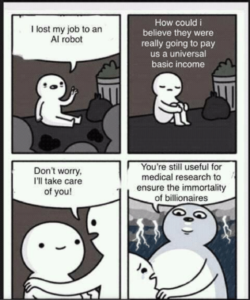
While memes are often considered less calculated and thoughtful than traditional news media sources, this is not necessarily true. This example displays how fearful people are of what a future could look like if Universal Basic Income is not adopted. In this meme, the creator identifies different power structures, and how people who lose their jobs to automation and artificial intelligence could end up desperate, lacking opportunity, and at the whims of elite billionaires and medical researchers. In many ways, this meme, as well as others, are used as a form of activism to express the ideas of its creators. Memes are especially useful as a form of activism because they are short, easily consumed, and easily shared. Memes often circulate on social media, where they are reposted by friends and acquaintances, and as such, the people viewing the memes are often already familiar with the topics. Additionally, memes are most commonly created by younger people who have grown up with the internet and internet culture. As a result, there is a different culture that has different expectations and conventions on how to express oneself and one’s ideas.
Universal Basic Income is a relatively new idea and program that offers individuals a consistent basic income in order to help them survive. It provides a safety net to people during times of economic uncertainty and economic change. Universal Basic Income has successfully been used during the 2020 pandemic in order to avert economic collapse and support people in need. Every organization, form of media, and media source has its own biases, perspectives and unwritten ideas. While traditional forms of media and media sources gravitate towards quotes and sharing the perspectives of politicians and prominent public figures, newer forms of media tends to come from and therefore represent the ideas and perspectives of average people who have been left out of the conversation.
References
Dyer, E. (2020, April 19). From pipe dream to prospect: the pandemic is making a case for a universal basic income. CBC News. Retrieved from https://www.cbc.ca/news/politics/universal-basic-income-covid-coronavirus-pandemic-1.5536144
Stevens, M., & Paz, I. G. (2020, March 18). Andrew Yang’s $1,000-a-Month Idea May Have Seemed Absurd Before. Not Now. The New York Times. Retrieved from https://www.nytimes.com/2020/03/18/us/politics/universal-basic-income-andrew-yang.html
Matthews, D. (2019, June 15). Andrew Yang, the 2020 long-shot candidate running on a universal basic income, explained. Vox. Retrieved from https://www.vox.com/2019/3/11/18256198/andrew-yang-gang-presidential-policies-universal-basic-income-joe-rogan
Harrison, A. (2020, April 10). It’s Time to Give Everyone Free Money. VICE. Retrieved from https://www.vice.com/en/article/dygbvw/why-universal-basic-income-makes-sense
Anderson, A [Digital Image]. (2020, April 20). Retrieved from https://www.facebook.com/photo/?fbid=10157980816130435
Universal Basic Income AI [Digital Image]. (n.d.). Retrieved from https://awwmemes.com/i/21590783